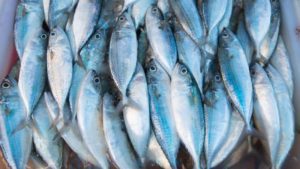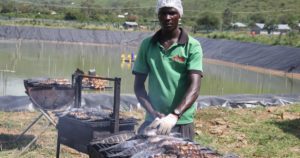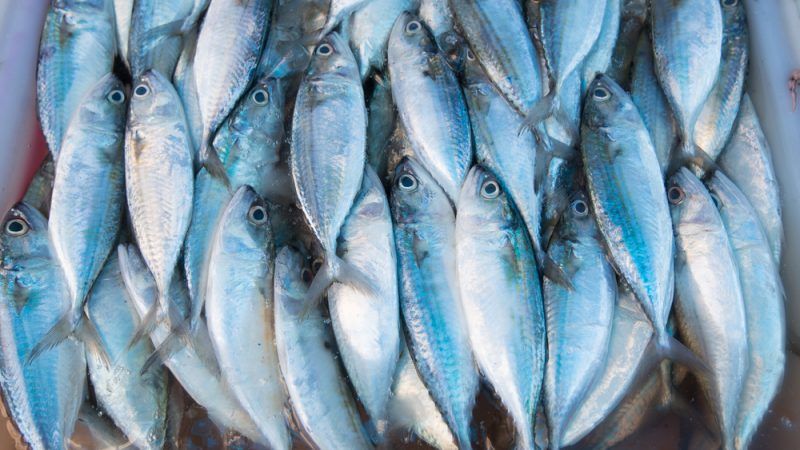The cash value of Fish imported from China into Kenya, increased by twenty five (25) percent to reach an all time high of 2 billion Kenyan Shillings. The occurrence took place at a time when there have been growing concerns from traders operating locally in Kenya who continue to have reduced market share.

Data from the State Department of Fisheries revealed that in 2021, Kenya imported a total of 14.8 million Kilogrammes of Fish from China, valued at 2 billion Kenyan Shillings. This is significantly higher than the 1.5 billion Kenyan Shillings that was the case the year before.
This means China’s market share increased from seventy (70) percent in 2020, to eighty three (83) percent, gradually edging out Uganda, Tanzania, Thailand, and South Korea which were the previous major source markets for Kenya.
Observers believe that China which is currently the biggest source of electronics and household goods imported into Kenya, is on pace to gain a larger share of all food exports into the African continent including manufactured edible goods, and Rice.
Read Also: Brazilian Payments Unicorn Sets Sights On Africa
In 2021 Kenya imported Fish worth a total of 2.47 billion Kenyan Shillings from the nineteen (19) countries that were sampled. This indicates a ten (10) percent increase from the 2.2 billion Kenyan Shillings that was the case in 2020.
The increase occurred as a result of efforts to effectively bridge the rising deficit that occurred when the supply from major domestic sources like Lake Victoria, reduced.
Other source markets during the period in question were Uganda with 57 million Kenyan Shillings, India with 78 million Kenyan Shillings, Tanzania with 92 million Kenyan Shillings and Norway with 96 million Kenyan Shillings.
Data from the industry revealed that the value of Fish imports into Kenya, has been on a steady increase over the past four (4) years, with 2020 being the only exception due to the Coronavirus pandemic. It is believed that the more affordable supplies from China, have played a role in its increased market share in the Kenyan market.

In 2018 the conversations around Fish imports from China dominating the Kenyan market led to a significant strain on the diplomatic relationship between both countries and resulted in Former President Uhuru Kenyatta, instructing that the government officials in Kenya should come up with ways to effectively reduce the imports.
Business Daily Africa carried out an interview with a fish trader; Josephine Miseti at Gikomba Fish Traders in Nairobi who made it known that the imports have impacted local businesses because they are unable to compete with the more affordable imports from China.
In her words, “A local fish that would cost Sh250 here cannot compete with that of the same size from China that will sell at Sh150.”
According to information from fisheries, Kenya brought in 19.6 million kilogrammes of Fish in 2021 worth 2.5 billion Kenyan Shillings. Imports from China made up 2 billion Kenyan Shillings of the total of 2.5 billion Kenyan Shillings worth of consignments into Kenya.
Read Also: How To Check And Retrieve Your NSSF Number
Former President Uhuru Kenyatta stated in 2018 that it was not possible for Kenya to be importing Fish when the local Fish traders have more than enough supply to meet demand.
When speaking at the Small and Medium-sized Enterprises (SMEs) conference held at Strathmore University in 2018 he stated that, “I have been told about the imported fish from China. It is not possible that we import fish when our local traders are here.”
On the flip side Fish exports by Kenya, achieved gains reaching an impressive 3.4 billion Kenyan Shillings during the review period. This is significantly higher than the 2.7 billion Kenyan Shillings achieved in the previous year.

The number one export destination for Kenya was the Democratic Republic of Congo (DRC) which received Fish exports worth 174 million Kenyan Shillings from Kenya. Italy came in next with a total of 163 million Kenyan Shillings in imports from Kenya and China was third with a total of 124 million Kenyan Shillings worth of exports.
Kenya currently has an yearly deficit of 365,000 tonnes of Fish compared to the demand of 500,000 tonnes which can only be met through imports.
Government officials have brought that forward as the reason why imports increased, adding that said imports from China cannot be stopped because of that.
The Department of Fisheries stated that, “We do not produce enough fish currently to meet our needs. It is a fact that we currently do not have enough hence need to import in order to meet the growing demand.”
Read Also: How To Transfer Data Bundles From One Airtel Number To Another
There had been Health worries in the past regarding imports from China. A joint research was carried out to that effect back in 2018 between the University of Nairobi (UoN) and The East African newspaper. The results from this research revealed traces of toxic metal in the Fish.
The University of Nairobi (UoN)’s laboratory tested Fish purchased from a wholesale source at Gikomba market which is the biggest open air fish market in Kenya, to determine if there was any residue and for drug analysis.
The test results also stated that the Fish tested has traces of Arsenic, Lead, Copper and Mercury. They were however in present in levels that are permitted by the World Health Organisation (WHO) seen as normal.

Experts have however issued warnings that continually consuming food products that Lead, Copper and Mercury could be harmful to one’s body.
Kenya has through the Economic Stimulus Programme, continued to promote Aquaculture and has done so since the time of Former President Mwai Kibaki.
One goal of the Economic Stimulus Programme initiative was the reduction of the deficit between demand and supply.
Aquaculture has supplied up to twenty four (24) percent of Kenya’s total fish production with the deficit being sourced from oceans and lakes.
Read Also: Safaricom Launches New Interest Free Credit Service For Goods Purchases Via M-Pesa
Kenya has still not reached the complete potential in fishing from the Indian Ocean. Local fisherman in Kenya are under the Exclusive Economic Zones, allowed to fish in as much as 200 nautical miles from the shores in Kenya. They have so far only operated at less than five (5) nautical miles as a result of the lack of the necessary fishing gear needed to explore the deep sea waters.
This has also led to fishermen from more developed nations with more technologically advanced kits, being able to exploit the fishing potential in Kenya.
Illegal fishermen have been utilizing the opportunity as well to engage in fishing activities in Kenya’s waters. The Kenyan government in response, launched the Coast Guard Service in 2021 in order to actively combats the Kenyan coast against said illegal fishermen.
How informative was this particular article? Are there any other news topics, categories, or How To topics, that you would like us to write on? Feel free to reach out to Nexbit KE in the comment section.


